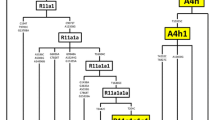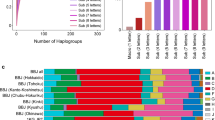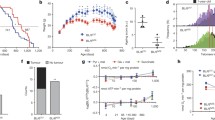Abstract
Polymorphisms in the human mitochondrial genome have been used for the elucidation of phylogenetic relationships among various ethnic groups. Because analysis by mitochondrial genetics has detected pathogenic mutations causing mitochondrial encephalomyopathy or cardiomyopathy, most of the mitochondrial single nucleotide polymorphisms (mtSNPs) found in control subjects have been regarded as merely normal variants. However, we cannot exclude the possibility that the mitochondrial functional differences among individuals are ascribable at least in part to the mtSNPs of each individual. Human lifespan in ancient history was much shorter than that at the present time. Therefore, it is reasonable to speculate that certain mtSNPs that predispose one toward susceptibility to adult- or elderly-onset diseases, such as Parkinson’s disease and Alzheimer’s disease, have never been a target for natural selection in the past. Similarly, thrifty mtSNPs that had been advantageous for survival under severe famine or cold climate conditions might turn out to be related to satiation-related diseases, such as diabetes mellitus and obesity. To examine these hypotheses, we have constructed a mtSNP database by sequencing the entire mitochondrial genomes of 672 subjects: 96 in each of seven groups (i. e., centenarians, young obese or non-obese subjects, diabetic patients with or without major vascular involvement, patients with Parkinson’s disease, and those with Alzheimer’s disease).
Access this chapter
Tax calculation will be finalised at checkout
Purchases are for personal use only
Preview
Unable to display preview. Download preview PDF.
Similar content being viewed by others
References
Tanaka, M. et al. 1998. Mitochondrial genotype associated with longevity. Lancet 351: 185–186.
Niemi, A.K. et al. 2003. Mitochondrial DNA polymorphisms associated with longevity in a Finnish population. Hum. Genet. 112: 29–33.
Chasman, D. & R.M. Adams. 2001. Predicting the functional consequences of non-synonymous single nucleotide polymorphisms: structure-based assessment of amino acid variation. J. Mol. Biol. 307: 683–706.
Weinreich, D.M. & D.M. Rand. 2000. Contrasting patterns of nonneutral evolution in proteins encoded in nuclear and mitochondrial genomes. Genetics 156: 385–399.
Rand, D.M., D.M. Weinreich & B.O. Cezairliyan. 2000. Neutrality tests of conservative-radical amino acid changes in nuclear-and mitochondrially-encoded proteins. Gene 261: 115–125.
Tanaka, M. 2002. Mitochondrial genotypes and cytochrome b variants associated with longevity or Parkinson’s disease. J. Neurol. 249 (Suppl. 2): II11–18.
Ingman, M. et al. 2000. Mitochondrial genome variation and the origin of modern humans. Nature 408: 708–713.
Yoshiike, N. et al. 1998. Descriptive epidemiology of body mass index in Japanese adults in a representative sample from the National Nutrition Survey 1990–1994. Int J. Obes. Relat. Metab. Disord. 22: 684–687.
Florez-Duquet, M. & R.B. McDonald. 1998. Cold-induced thermoregulation and biological aging. Physiol. Rev. 78: 339–358.
Hara, H., G. Egusa & M. Yamakido. 1996. Incidence of non-insulin-dependent diabetes mellitus and its risk factors in Japanese-Americans living in Hawaii and Los Angeles. Diabet. Med. 13: S133–142.
Tanaka, M. & T. Ozawa. 1994. Strand asymmetry in human mitochondrial DNA mutations. Genomics 22: 327–335.
Gong, J.-S. et al. 1998. Mitochondrial genotype frequent in centenarians predisposes resistance to adult-onset diseases. J. Clin. Biochem. Nutr. 24: 105–111.
Umetsu, K. et al. 2001. Multiplex amplified product-length polymorphism analysis for rapid detection of human mitochondrial DNA variations. Electrophoresis 22: 3533–3538.
Tanaka, M. et al. 2000. Mitochondrial genotype associated with longevity and its inhibitory effect on mutagenesis. Mech. Ageing Dev. 116: 65–76.
Walker, J.E., J.M. Skehel & S.K. Buchanan. 1995. Structural analysis of NADH: ubiquinone oxidoreductase from bovine heart mitochondria. Methods Enzymol. 260: 14–34.
Brown, M.D. et al. 1992. Mitochondrial DNA complex I and III mutations associated with Leber’s hereditary optic neuropathy. Genetics 130: 16373.
Matsunaga, H. et al. 2001. Antiatherogenic mitochondrial genotype in patients with type 2 diabetes. Diabetes Care 24: 500–503.
Kokaze, A. et al. 2001. Association of the mitochondrial DNA 5178 A/C polymorphism with serum lipid levels in the Japanese population. Hum. Genet. 109: 521–525.
Kokaze, A. et al. 2003. Longevity-associated mitochondrial DNA 5178 A/C polymorphism influences effects of cigarette smoking on serum protein fraction levels in Japanese men. Mech. Ageing Dev. 124: 765–770.
Yamada, Y. et al. 2002. Prediction of the risk of myocardial infarction from polymorphisms in candidate genes. N. Engl. J. Med. 347: 1916–1923.
Author information
Authors and Affiliations
Corresponding author
Editor information
Rights and permissions
Copyright information
© 2004 Springer-Verlag Berlin Heidelberg
About this chapter
Cite this chapter
Tanaka, M., Takeyasu, T., Fuku, N., Li-Jun, G., Kurata, M. (2004). Mitochondrial Genome Single Nucleotide Polymorphisms and Their Phenotypes in the Japanese. In: Lee, H.K., DiMauro, S., Tanaka, M., Wei, YH. (eds) Mitochondrial Pathogenesis. Annals of the New York Academy of Sciences, vol 1011. Springer, Berlin, Heidelberg. https://doi.org/10.1007/978-3-662-41088-2_2
Download citation
DOI: https://doi.org/10.1007/978-3-662-41088-2_2
Publisher Name: Springer, Berlin, Heidelberg
Print ISBN: 978-1-57331-491-6
Online ISBN: 978-3-662-41088-2
eBook Packages: Springer Book Archive




